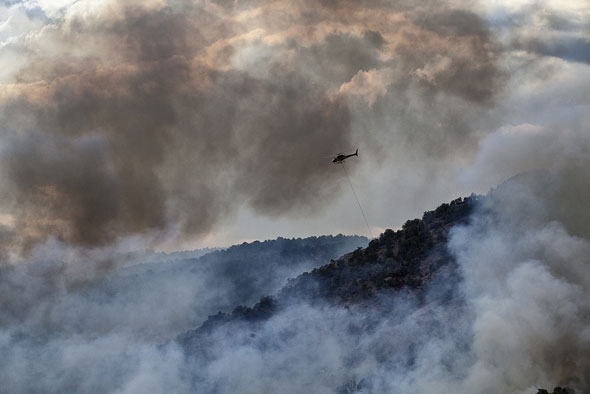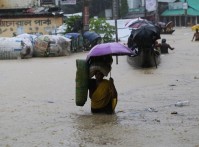-
Inside U.S. Climate Security Policy: Geoff Dabelko Interviewed by ISN
August 20, 2012 By Kate Diamond
Climate change “has been thought of in many quarters as something that affects folks ‘over there,’ and not as much domestically, and I think that’s a mistake,” said ECSP’s Geoff Dabelko in a recent podcast with the Zurich-based International Relations and Security Network. “I think folks are coming to a realization that there are very high economic, political, and ultimately security stakes for the United States.”
Security Linkages Abroad
Given the United States’ unique role “as a global actor,” the climate-security debate in the States tends to be focused abroad, said Dabelko. In the Arctic, for example, “the Navy is very interested in…what climate change means there for training, for procurement, and for new access to resources, for delineation of borders.” Meanwhile in places like the Middle East, the Horn of Africa, and South Asia, the focus is on “what the anticipated impacts of climate change will be on availability of water, on extreme weather events, both within countries and across countries.”
Importantly, Dabelko noted, a changing climate does not automatically portend conflict.
“Climate change is not seen as necessarily a determining factor in, say, the stability of the Horn of Africa. But it has come to be viewed as…threat multipliers or an accelerant of conflict,” he said. “So in that sense it’s seen as an exacerbating factor that’s not going to make any of those tough situations any easier to deal with.”
The Arctic is another case in point. “The terms that [the Navy] has used is that it’s a challenge, and not a crisis, that the political institutions are up to negotiating some very new sets of challenges but that there’s not a concern, for example, around overt violence associated with those changes.”
…And at Home
While there is ample discussion of the security implications of climate change abroad, “the climate-security debate has been behind, so to speak, in understanding what those links mean for the United States territories themselves,” Dabelko said.
Hotspots like the Gulf Coast and the Southwest could be all the more susceptible to extreme weather events and water scarcity in the future. “The concern is that climate is going to increase the scale and severity of some of those challenges,” he said.
While this summer’s extreme weather – from derechos hitting East Coast cities to the drought covering the country’s heartland – has brought climate change to the fore, the fact remains “that these phenomena are highly complex,” Dabelko said, “and how much or how little they are due to climate change is difficult if not impossible to pinpoint.”
Ensconced in Bureaucratic Silos
Even with so much attention focused on climate change, Dabelko sees clear hurdles to how the United States addresses it and other environmental trends, like water scarcity.
“In some ways the way we organize ourselves in the United States, for example to manage water, doesn’t lend itself to that broader vision,” he said. “Water is managed at a very local, municipal, and state level, first and foremost…and while we do have some federal legislation – the Clean Water Act – there aren’t as many effective mechanisms at the national level that one might think” for addressing a threat as wide-ranging as climate change.
“Climate change is something that literally affects all portfolios, and in that sense all portfolios, all government offices, all academic departments, all foundations, funders, the private sector – everyone has a role to play,” Dabelko said. “Unfortunately we still remain comfortable and ensconced in our bureaucratic silos, and we aren’t particularly good at learning the language, the acronyms, the tools, the objectives of other parts of government, other governments themselves.”
According to Dabelko, those “arbitrary” divisions will have to be overcome if the United States is to make real progress on climate change and the slew of security implications it has, both domestically and globally.
“I think to make fundamental progress in recognizing the challenges that climate faces and fashioning effective responses, we have to become much more fluent in other’s languages,” he said.
“We’re still in many ways trying to take some of those first steps by…delving into a conversation that may not always be familiar or even comfortable, but a conversation that has to happen in order for us to make real progress.”
Sources: ISN ETH Zurich.
Photo Credit: “Air Park Fire” by flickr user inlandwest. Podcast: ISN ETH Zurich.
Topics: Africa, Arctic, Asia, climate change, conflict, environment, featured, Middle East, military, podcast, security, U.S., water
 A Publication of the Stimson Center.
A Publication of the Stimson Center.






